Hungary’s Justice Minister: ‘Our issues with George Soros are not antisemitism’
László Trócsányi says he has a lot of Jewish friends and none of them has expressed fear over life in Hungary. He also describes Israel as a 'beautiful country'
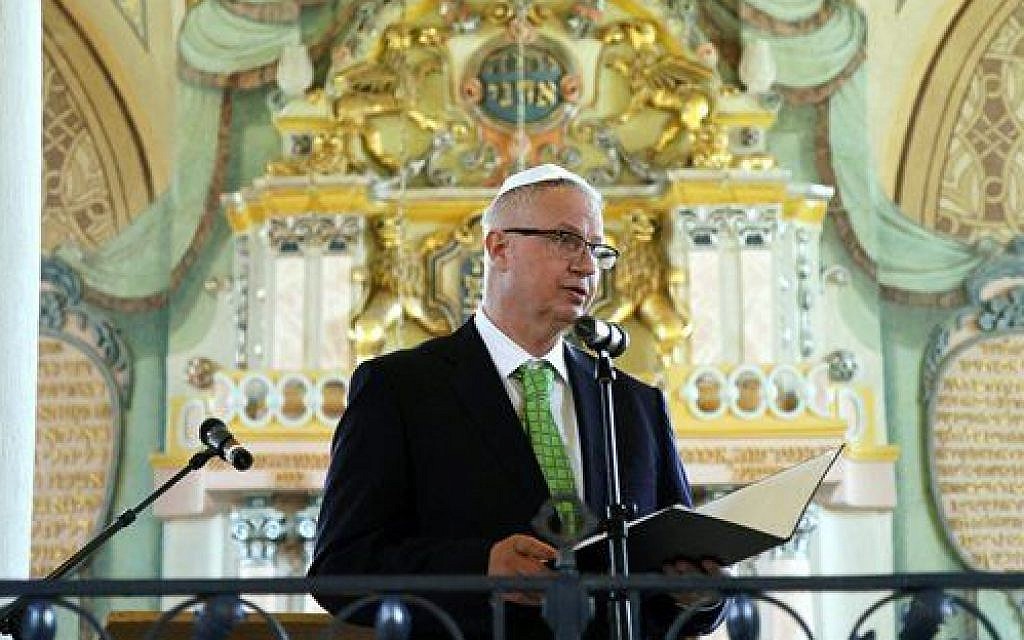
Hungary’s Justice Minister is absolutely clear: whatever issues his country has with philanthropist George Soros, it has nothing to do with antisemitism.
The Hungarian government, under Prime Minister Viktor Orbán, has been criticised for using what many critics see as antisemitic tropes when it criticises its foreign and domestic detractors.
The national conservative Fidesz Party-led government’s chief target has been the Hungarian-born Soros, who has become almost a pantomime villain in the eyes of many in the far-right in the US, Israel and even the UK.
Get The Jewish News Daily Edition by email and never miss our top stories Free Sign Up
The antisemitic imagery and rhetoric have caused many Hungarian Jews to express concerns about the direction the country was taking, with a poll in June suggesting that two-thirds of the community believe antisemitism is a serious problem in their country.
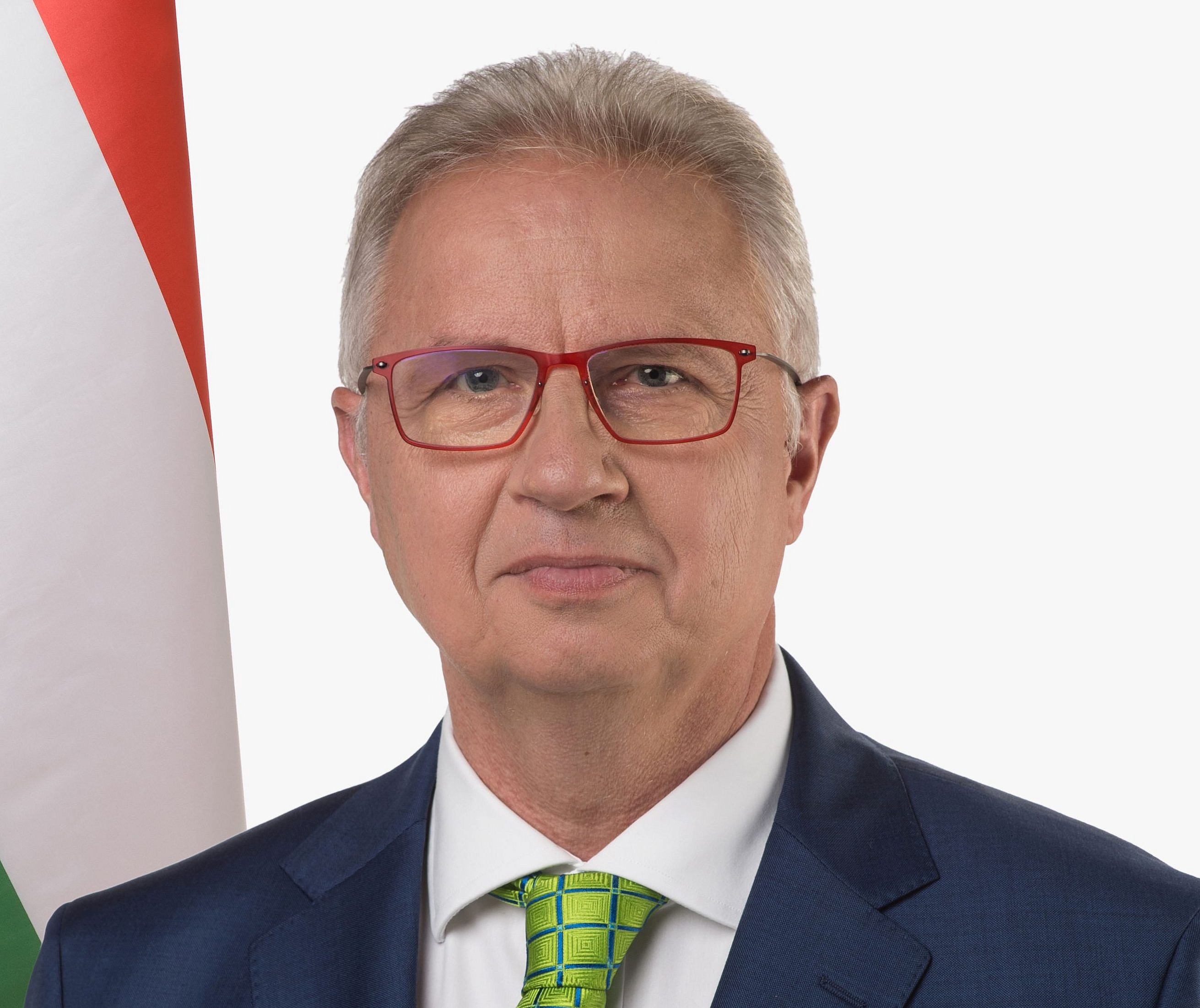
However, in an exclusive interview with Jewish News, Minister László Trócsányi made it clear that he had “a lot of Jewish friends”, adding that he had “never ever heard them express any fear about anything in Hungary. The Jewish community can feel safe, they are safe in Hungary.”
The issue with Soros was completely different, said Trócsányi. “I do not see antisemitism when it comes to Soros. What I see is an ideological debate on current affairs. Today, in the 21st century, everybody is seeking their identity, Jews and Hungarians and Hungarian Jews alike.
“Identity has become an issue of great importance especially in this contemporary ever-changing world where we are facing migration and a myriad of other questions. Hungary is also confronted with these issues.”
He added: “For my part, I have read the statements made by George Soros in which he said Europe should allow these migrants to come in and that Europe should be able to absorb a million migrants a year.”
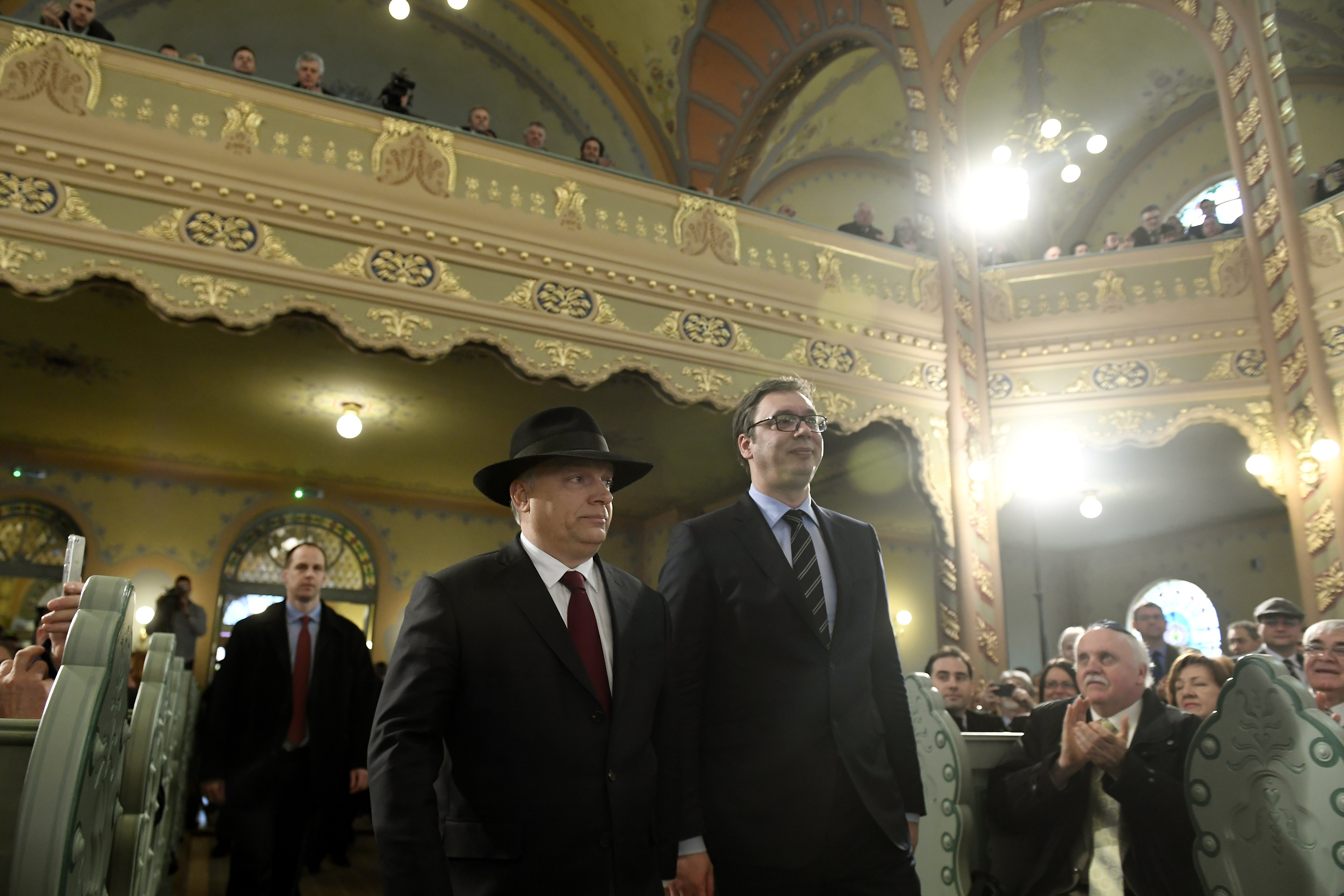
Hungarians, Trócsányi said, are a “very homogeneous people. We have also seen the difficulties of integration in some Western European countries. I myself spent four years serving in Brussels and four years in Paris. So, there are difficulties there.”
Trócsányi’s statement about Jews seems also to be at odds with some of those made by Orbán, who said in March: “We are fighting an enemy that is different from us. Not open but hiding; not straightforward but crafty; not honest but base; not national but international; does not believe in working but speculates with money; does not have its own homeland but feels it owns the whole world.”
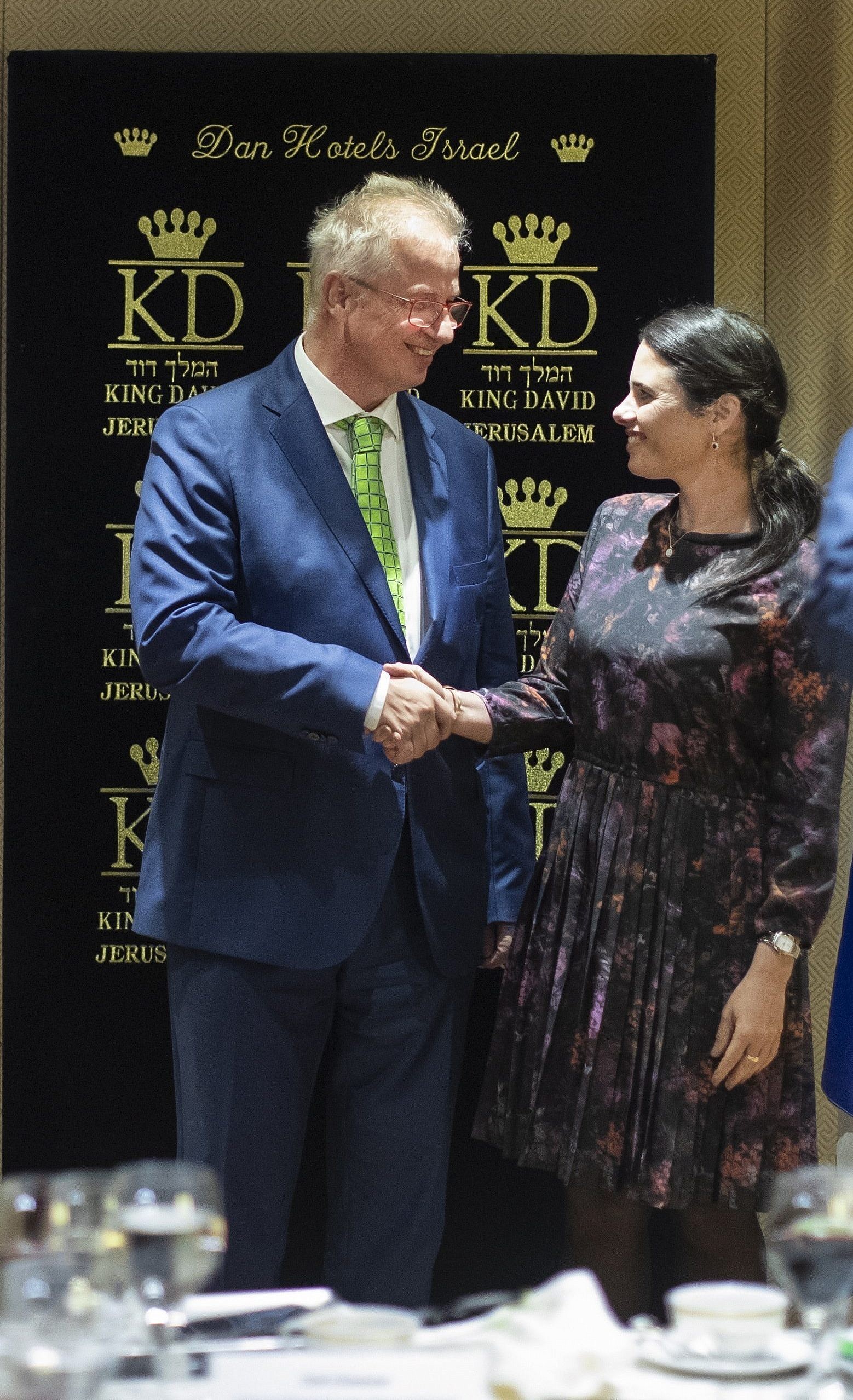
He added that in Israel – which he described as a “beautiful country” having visited several times where he struck up a friendship with his counterpart Ayelet Shaked of the nationalist-religious Jewish Home party – too, Soros was a “controversial” figure.
“It’s only natural if someone is rich and decides to participate in politics that he will face criticism,” the minister added.
Indeed, Prime Minister Benjamin Netanyahu has accused Soros of financing the campaign in Israel against his plan to deport 30,000 African asylum-seekers and refugees.
And Netanyahu’s son, Yair, sparked anger in Israel and elsewhere when he posted on his Facebook account a cartoon of Soros dangling the world in front of a reptilian creature, as well as a figure highly reminiscent of the antisemitic “happy merchant” image.
The cartoon was seized upon, reposted and praised by some neo-Nazi groups in the US.
Meanwhile, Hungary is considered to be Israel’s best friend in the Visegrád Group of Central European EU states – the Czech Republic, Hungary, Poland and Slovakia – which are themselves all considered to be pro-Israel.
Trócsányi said: “Visegrád countries have a different approach to migration than Western European states… Israel, when it comes to migration issues, is pretty much of the same opinion as Hungary. There is an understanding between us. The things that binds us are that we do see a bureaucratic solution to migration such as the quota system as suggested by Brussels.
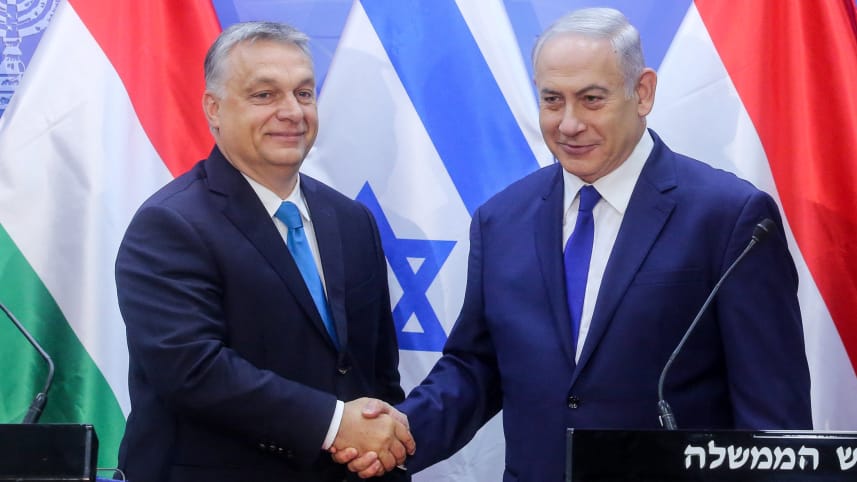
“Instead we are examining this whole issue in a broader, more global context. And this is one of the reasons that links our region, the Visegrád countries, with Israel.”
Then there’s the issue of Miklós Horthy, who was Hungary’s de facto wartime leader under the Nazis and Miklós Horthy whom Orbán once described as a “great statesman”.
Trócsányi said: “There are things we should be proud of, and other things that we are not proud of. We are proud of the 1848 and 1956 revolutions when we fought for our freedom and many Jews took part.
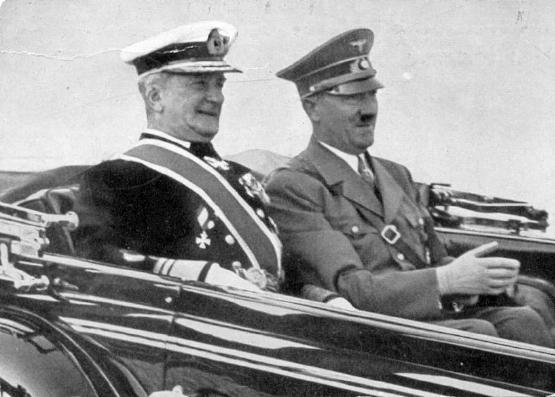
“Horthy was a controversial person, much like [Marsha; Philippe] Pétain in France. However, after the Versailles Treaty [which led to the dismantling of the Austro-Hungarian Empire], we were in dire straits, in chaos, and Horthy began a programme of stabilisation.”
He noted that Hungary did its best to curb racism. “Our government, with me as justice minister, has banned paramilitaries from marching in the streets and we have forbidden any form of discrimination against any community, irrespective of race, gender or ethnicity.
“And, within the boundaries of freedom of expression, there is an absolute need to fight against hate speech.”
Listen to this week’s episode of The Jewish Views podcast! SPECIAL EDITION – Chanukah in the Square!

Thank you for helping to make Jewish News the leading source of news and opinion for the UK Jewish community. Today we're asking for your invaluable help to continue putting our community first in everything we do.
For as little as £5 a month you can help sustain the vital work we do in celebrating and standing up for Jewish life in Britain.
Jewish News holds our community together and keeps us connected. Like a synagogue, it’s where people turn to feel part of something bigger. It also proudly shows the rest of Britain the vibrancy and rich culture of modern Jewish life.
You can make a quick and easy one-off or monthly contribution of £5, £10, £20 or any other sum you’re comfortable with.
100% of your donation will help us continue celebrating our community, in all its dynamic diversity...
Engaging
Being a community platform means so much more than producing a newspaper and website. One of our proudest roles is media partnering with our invaluable charities to amplify the outstanding work they do to help us all.
Celebrating
There’s no shortage of oys in the world but Jewish News takes every opportunity to celebrate the joys too, through projects like Night of Heroes, 40 Under 40 and other compelling countdowns that make the community kvell with pride.
Pioneering
In the first collaboration between media outlets from different faiths, Jewish News worked with British Muslim TV and Church Times to produce a list of young activists leading the way on interfaith understanding.
Campaigning
Royal Mail issued a stamp honouring Holocaust hero Sir Nicholas Winton after a Jewish News campaign attracted more than 100,000 backers. Jewish Newsalso produces special editions of the paper highlighting pressing issues including mental health and Holocaust remembrance.
Easy access
In an age when news is readily accessible, Jewish News provides high-quality content free online and offline, removing any financial barriers to connecting people.
Voice of our community to wider society
The Jewish News team regularly appears on TV, radio and on the pages of the national press to comment on stories about the Jewish community. Easy access to the paper on the streets of London also means Jewish News provides an invaluable window into the community for the country at large.
We hope you agree all this is worth preserving.
-
By Brigit Grant
-
By Laurent Vaughan - Senior Associate (Bishop & Sewell Solicitors)
-
By Laurent Vaughan - Senior Associate (Bishop & Sewell Solicitors)
-
By Laurent Vaughan - Senior Associate (Bishop & Sewell Solicitors)
-
By Laurent Vaughan - Senior Associate (Bishop & Sewell Solicitors)





















